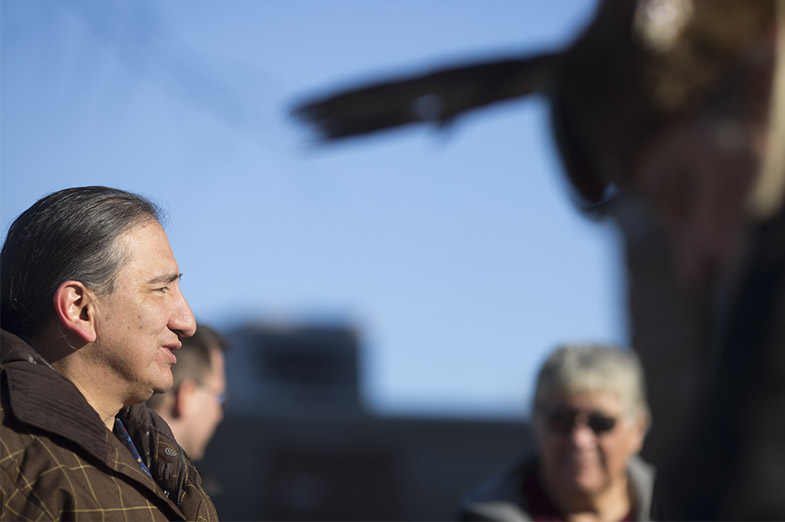
6:55 p.m. update:
Twenty of 22 provincial offences charges stemming from Batchewana First Nation's actions eight years ago to re-establish road access to Gargantua Harbour in Lake Superior Provincial Park were dismissed in court Tuesday.
But Justice of the Peace Thomas Logan found the first nation and its chief Dean Sayers guilty of unlawfully obstructing a conservation officer for threatening to bring guns with them to re-open the road in the fall of 2007.
Logan fined the band $10,000 and suspended sentence for Sayers, indicating he believed that this is not in the chief's nature.
"History is full of examples where chiefs were swept along with hot heads," he said.
Both convictions will be appealed, Sayers and the First Nation's lawyers said.
The chief called the dismissal of the 20 charges "a great day" for the Anishinabek and said he is pleased with the ruling which upholds the first nation's treaty rights.
"That is a small victory for our First Nation and for all First Nations," he said outside the courthouse. "We have lots of reasons to celebrate."
Batchewana always has been progressive in asserting the First Nation's rights, Sayers said.
"It is encouraging to be positively affirmed by the justice at this level. It is all too often we are promised one thing and handed another," he said.
"We hope this really sends a clear message to the province that prohibiting First Nations from accessing their territory will not be condoned."
The Ministry of Natural Resources laid the charges under the Provincial Parks and Conservation Reserves Act and The Lakes and Rivers Improvement Act in 2008.
The court heard, in an agreed statement of facts, that the actions were taken along two kilometres of the Gargantua Road in the provincial park, north of Sault Ste. Marie.
Between Sept. 28 and Oct.18, 2007, a gate and sign (the property of the Crown) were damaged and removed, two wooden bridges were removed, an arched culvert was installed to serve as a water crossing and four pipes were utilized for another water crossing.
As well, vegetation was cut and the work was done without obtaining permits or authorizations from Ontario Parks or the MNR for any of the work.
The band says it was attempting to reconstruct an access road to its traditional territory for cultural and ceremonial reasons.
Calling it "the crux of this case," Logan concluded in his 22-page decision that the defendants had shown that treaty rights exist for Batchewana members in the Gargantua area (known to them as Nanabozhung).
"A treaty right to commercially fish the waters of the area in question has been shown," he said. "Access to the harbour by vehicles was the primary reason for the road being re-opened, prompted by low water levels in Lake Superior at that time."
Referring to his finding of guilt for the obstruction charges, Logan said the threat to bring guns to the road re-opening was in response to information from an Ontario Parks manager that conservation officers (who have been armed for more than 120 years) would be in the park.
"Activist endeavours such as this road re-opening require the moral high ground. Guns are never to be the fall back position. No Elder worthy of the title would condone the bringing of women, children and guns for confrontation."
Citing the need for deterrence, MNR counsel Brian Wilkie urged the JP to fine Batchewana $10,000 and Sayers $3,000 for the offences.
The threat was successful, the government backed off and no one was there to collect evidence, he said.
When he dismissed the charges against Batchewana, Logan noted the standard of proof concerning these counts hadn't been met because there were no "boots on the ground" to provide direct evidence because of a threat made by the band's officials to bring guns.
Defence counsel Jennifer Tremblay-Hall suggested a $3,000 fine for the First Nation and $1,000 for Sayers.
The MNR made it clear it would have armed officers there, she said.
"What is the point of saying that? Conservation officers are always armed," Tremblay-Hall said, adding Sayers and the band didn't condone bringing guns there.
This battle for asserting treaty rights started eight years ago, she said, and could all have been avoided with proper negotiations.
Earlier story:
A justice of the peace has dismissed all charges, except a count of obstruction against the Batchewana First Nation and it's chief, in connection with Gargantua Harbour.
In a decision released this morning, Justice of the Peace Thomas Logan found Chief Dean Sayers and the first nation guilty of the charge, one of several counts laid by the Ministry of Natural Resources in 2008.
The charges stem from 2007 when Sayers and about 200 band members re-established road access to Gargantua Harbour in Lake Superior Provincial Park, north of Sault Ste. Marie.
After providing the lawyers with copies of his 22-page decision, Logan adjourned the matter until this afternoon to give them time to digest his decision and to determine how they want to proceed with sentencing.
The provincial offences charges were laid under the Provincial Parks and Conservation Reserves Act and the Lakes and Rivers Improvement Act.
(PHOTO: Chief Dean Sayers of the Batchewana First Nation speaks prior to a decision March 24, 2015 at the courthouse in Sault Ste. Marie. Kenneth Armstrong/SooToday)